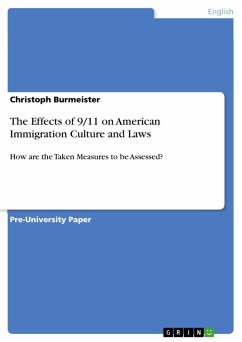Seminar paper from the year 2015 in the subject English Language and Literature Studies - Other, grade: 2,3, Technical University of Braunschweig (Institut für Anglistik und Amerikanistik), language: English, abstract: This text examines the effects of the Mexican Diaspora on the US American society as a complex example in intercultural learning classes at german schools. What can we as teachers learn from the situation in the United States and what can we do to avoid such in Europe and Germany? In my view it is possible to convey students that early arrangements of integration can support the social peace and the mutual acceptance within multiethnic societies through information about the diverse problems of strong Mexican parallel societies in the US. In the following I am going to conduct an objective clarification of the important matters which influenced today's situation in the United States. Therefore, I will examine the historical development of the Mexican American relationship beginning with the end of the Mexican American War in 1848, the economic effects on Mexican migrants and the United States, the mutual prejudice, and the integrational efforts. During the further procedure I want to focus on how teachers in Germany can prevent a situation like the US has to face it currently. "If you meet the criteria, you can come out of the shadow and get right with the law. If you are a criminal, you will be deported. If you plan to enter the U.S. illegally, your chances of getting caught and sent back just went up." President of the United States Barack Obama used these words in his speech about the problems of the immigration system of his country. The goal of his speech was to convince the citizens of the United States of his plan to legalize the status of about five million illegal immigrants, taking into account some specific conditions. This offer counts mainly for parents who live illegally in the US but have children with US-citizenships or who have a work permission and live there since at least five years. It also counts for people who migrated illegally as children to the United States. Obama wants to enforce this primarily to get these people 'out of the shadows' and thereby out of criminality. Furthermore, he wants to free the illegal migrants from the omnipresent fear of being deported. But the point is, like Obama said in his speech, due to the fact that illegal migrants have to stay in the shadows of their society, parallel societies arise and split the people of a country, like it already happened in the United States.
Dieser Download kann aus rechtlichen Gründen nur mit Rechnungsadresse in A, B, BG, CY, CZ, D, DK, EW, E, FIN, F, GR, HR, H, IRL, I, LT, L, LR, M, NL, PL, P, R, S, SLO, SK ausgeliefert werden.









